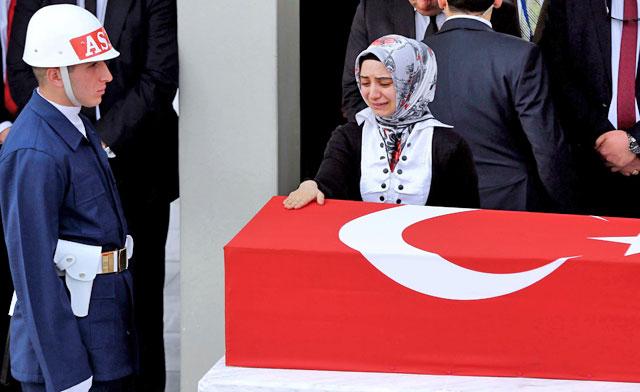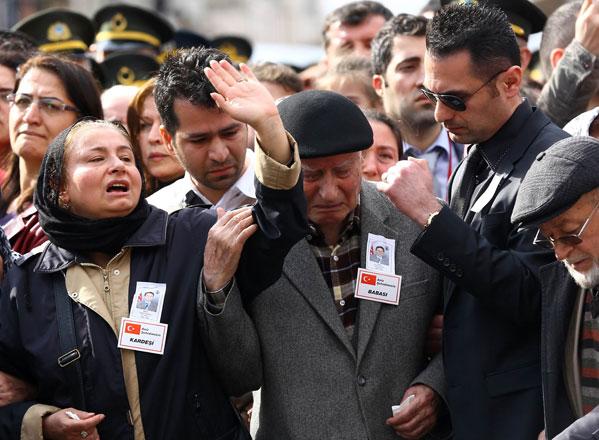You are here
Turkey blames Syrian Kurdish fighters for Ankara attack
By AFP - Feb 18,2016 - Last updated at Feb 18,2016

A relative of Army Officer Seckin Cil, who was killed during an operation in Sur district of the southeastern city of Diyarbakir, cries as she stands next to the coffin during the funeral ceremony in Ankara, on Thursday (AFP photo)
ANKARA — Turkey on Thursday blamed Kurdish militants based inside the country and in Syria for a car bombing targeting a military convoy in Ankara that killed 28 people and risked a new escalation of the Syrian conflict.
The massive bomb blast struck five buses carrying military service personnel when it stopped at a traffic light in the centre of the capital on Wednesday evening.
It was the latest in a string of deadly strikes that have rocked Turkey since last summer and one of the deadliest assaults targeting the military in the NATO member state in recent years.
Also Thursday, at least six soldiers were killed in an attack on their convoy in the Diyarbakir region of southeastern Turkey blamed on Kurdish militants, security sources said.
Prime Minister Ahmet Davutoglu and President Recep Tayyip Erdogan both said the Ankara attack was a joint operation of the outlawed Kurdistan Workers' Party (PKK) in cooperation with the Syrian Kurdish People's Protection Units (YPG).
"It has with certainty been revealed that this attack was carried out by members of the terrorist organisation in Turkey in cooperation with a YPG member who infiltrated from Syria," Davutoglu told reporters.
He said the bomber was a Syrian national named Salih Necar.
Davutoglu warned Russia — who Turkey accuses of actively backing the YPG in Syria’s civil war — that Moscow would be “held responsible” if such attacks continued.
“This game of terror can come back and hit them like a boomerang,” he said.
Erdogan said 14 people had been detained in nationwide raids across Turkey and that the number was likely to rise.
‘Convince our allies’
The attack struck the heart of power in the Turkish capital in an area where the headquarters of the army, the parliament and prime minister’s offices are in close proximity.
Pictures showed at least two of the vehicles reduced to burnt-out wrecks, and the massive blast was heard from all over the city, causing panic among locals.
Ankara was already on alert after 103 people were killed on October 10 in a double suicide bombing blamed on Daesh militants.
Davutoglu said 27 of the dead were military staff and one was a civilian. Reports said she was Gulsen Yildiz, a journalist specialising in agriculture.
Eighty-one people were wounded, seven of whom are still in intensive care, the health ministry said.
Hours after the attack, Turkey’s air force launched new strikes on PKK targets in northern Iraq, acting on intelligence that there were dozens of fighters including top rebel leaders in the area, the army said.
The YPG and its political wing the Democratic Union Party (PYD) deny being PKK branches and argue they have no interest in attacking Turkey.
PYD head Saleh Muslim rejected any responsibility for the Ankara blast, telling AFP the group had “never heard of this person Salih Necar”.
Turkey considers both the PKK and YPG to be terror groups, in a rare rift with the United States, which only classifies the PKK as a terror outfit and works closely with the YPG as an effective force fighting Daesh militants in Syria.
“This process will help our friends — who we could not convince so far — better understand how strong the links are between the PYD and YPG in northern Syria with the PKK in Turkey,” said Erdogan.
Turkey has in the last months waged an all-out assault on the PKK, which launched an insurgency against the Turkish state in 1984, fighting for greater autonomy and rights for the country’s largest ethnic minority.
In a bid to up the diplomatic pressure on world powers to condemn the YPG, ambassadors from the five permanent UN Security Council members plus Germany were “invited” to the foreign ministry to receive a briefing on the bombing, an official told AFP.
Hitting out at foreign support of the YPG, deputy prime minister Yalcin Akdogan lashed out at the “hypocrisy of those who send weapons to terrorist organisations and message of condolences to us”.
‘Fighters cross to Syria’
Turkey fears the Syrian Kurds want to carve out an autonomous region across the border in northern Syria stretching from the Iraqi border almost to the Mediterranean.
Ankara is concerned the Kurds will now take a “corridor” east of the flashpoint border town of Azaz — currently still in control of rebels — to link up two Kurdish-held areas.
A monitoring group said at least 500 rebels on Wednesday crossed the Turkish border heading for Azaz.
“They want to help the insurgents in the face of gains made by Kurdish forces in the north of the province,” the Britain-based Syrian Observatory for Human Rights said.
Turkey for five consecutive days up to Wednesday shelled Syrian Kurdish targets inside Syria, saying the military was responding to incoming fire.
Meanwhile, strikes by a US-led coalition against the Daesh terror group killed at least 15 civilians, including three children, in northeastern Syria on Thursday, it added.
Related Articles
ANKARA — A DNA report from a suicide bombing that killed 29 people in the Turkish capital Ankara last week suggests the main perpetrator was
ISTANBUL — After months of tensions, Turkey is taking on Syrian Kurdish fighters inside Syria in a move that risks inflaming tensions with i
ANKARA — Turkish Prime Minister Ahmet Davutoglu on Saturday called on the United States to give unconditional support in the fight against S













